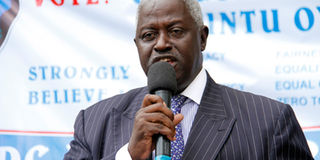‘I gave Museveni his first mobile phone’

Waswa Birigwa at a function recently. Photo by Abubaker Lubowa
What you need to know:
The origin. Twenty years ago, Wasswa Birigwa ventured into uncharted waters to start a mobile telephone company in Uganda. Henry Lubega caught up with the former Cetel Uganda managing director and he shares his story on how it all started.
I had left the country in the late 1960s when people of Asian origin started leaving the country. I returned to Uganda in 1986 and there are things I had got so used to and I thought they were part of life. Among these things included the telephone. But I was shocked when I applied for a telephone line to my home on Wampewo Avenue and I was told to wait for at least four months to get one.
I could not believe it. I immediately started doing research on telephones as I carried on with my new job as a deputy general manager Coffee Marketing Board, Mombasa office.
I had some background knowledge about telecommunication when I worked with a computer company in the US. I worked on a project called upper net, which dealt with data switching at the beginning of the Internet.
Upon my return, I seriously thought of how to have a mobile phone in Uganda. Fortunately, I ran into a good friend of mine, Colin Sentongo. I told him about my phone problem and how I thought it could be solved. He told me I was not the only one thinking about it. He told me there were some people with the same thinking whom he wanted me to meet.
That was when I met an Indian called Shiraz Hudani and later Azim Kassim. I met another person based in Sweden. They had a family business called Clovegem, a fish-processing plant in Entebbe. We put our plans together and that was how CELTEL Cellular Telephone was born.
Hurdles on the way
In 1993, armed with our idea and work plan, we approached the Uganda Posts and Telecommunication for a licence, but they refused. At that time, they had the monopoly in telecommunication. After listening to us, they said they were after all planning to launch a mobile network.
But a one Patrick Masambu saw merit in what we had proposed to them and became very helpful.
In order to have the monopoly broken, I had to make sure there was a law that liberalises the sector. We petitioned Mayanja Nkangi, the then Attorney General, and he bought the idea. But the one person to whom I owe much appreciation to the passing of the law enabling us to start operation is the current Prime Minister Ruhakana Rugunda, then minister of Transport and Communications.
With the licence secured, we looked for other partners, and this was how Vodafone and Mo Ibrahim, through his company Mobile Systems International MSI, came on board. Mo Ibrahim later bought out other shareholders and became the majority shareholder.
Technology
At the time, analogue mobile phones were working well and cheap. But I rejected that option because their technology was soon getting outdated. I decided that we use the more advanced Global System for Mobile (GSM). This is the one which was being used in most Scandinavian countries and some European ones as well.
At the time we opened shop, we had to bring in the handsets. This is not how telecom companies make money, they make money through airtime sales.
Therefore, the cost of purchasing handsets to break the ground in mobile telecommunication made it a very expensive venture hence the high costs. Besides, there was a loan to be serviced. When we launched in 1995, we were using digital not analogue.
Soon before the official launch in 1995, I was appointed the managing director Celtel Uganda. Despite being a shareholder and founder, Shariz Hudan and I, were part of the people interviewed by Ernest and Young which had been contracted to look for a managing director.
Dr Specioza Wandira Kazibwe, then vice president, officially opened our shop in 1995. She made the first mobile international call from Uganda to England. I gave President Museveni his first mobile phone, a Motorolla.
Since then, we opened the door for more companies to follow us and with the successful Celtel Uganda, I went on to open Celtel in other central and west African countries.
When Mo Ibrahim became the majority shareholder, the company went through changes and it was sold first to Zain, before changing hands and name again to Bhati Airtel.
Raising capital
We invested $16m. Almost 60 per cent of it was raised through loans from International Finance Corporation (IFC), which is part of the World Bank, Commonwealth Development Corporation (CDC), MSI of Mo Ibrahim, Vodafone, Clovergem fish factory and some of my savings.



